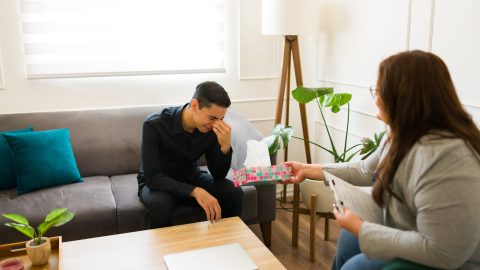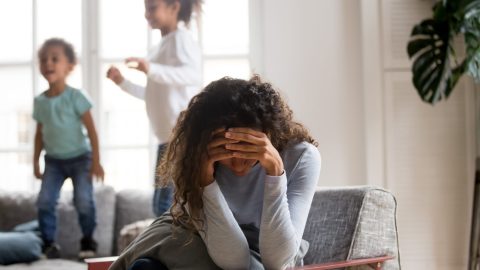
Many are undulating through waves of worry and sadness as we experience the effects of COVID-19. Our lives look very different from how they did 6 months ago. Dr. Richard Nicastro, PhD looks at the connection between depression and anxiety and the importance of addressing them.
If you’ve ever experienced depression, you may be one of the many individuals who have also experienced anxiety at the same time. The reverse is also true: many people who have experienced anxiety have also simultaneously suffered from depression. Indeed, research shows that anxiety and depression often occur together.
When depression and anxiety coexist, each can feed the other, which is why for treatment to be effective, it must address both. However, sometimes it’s hard to identify that there are two conditions present.
In my capacity as psychologist/therapist for over twenty years, I’ve worked with many individuals suffering from concurrent depression and anxiety. Although each of their stories is unique, general similarities within the struggles often exist.
While it’s true that no one person can speak for everyone who has experienced depression or anxiety (or any emotional pain, for that matter), it can be helpful for those in pain to know that others understand and that they’re not alone in their pain.
What follows is a type of amalgam of those many voices: it’s an article borne of my knowledge of the research behind coexisting depression and anxiety, and borne of my experience working with people simultaneously struggling with depression and anxiety.
Giving voice to depression and anxiety
“Some of my friends and family that haven’t been depressed equate it with being in a bad mood or being disappointed in not getting a raise or something. Not true for me: I’ve wrestled with some form of depression since my adolescence.
“When depression starts to take hold of me, self-care is usually the first thing to fall away; I start to skip workouts and then exercising stops altogether. The activities I usually look forward to turn to chores I start to avoid. Depression suffocates other feelings, especially contentment, excitement, and joy. I start to feel cynical instead of optimistic.
“At my lowest, I start to struggle with caring . . . about anything. My family has called me out for seeming indifferent or callous. Traits that I normally hate in others, impatience and criticalness, start to fit like a glove on me. I flip between despair and agitation. Nothing feels right.
“I know the people who love me only want me to feel better, but they say things that miss the mark for me, things like: ‘It would be good to get out of the house, do you want to go to dinner somewhere?’; ‘Maybe working out will give you a boost?’; ‘Maybe you should talk to a professional?’
“When my depression is relatively mild, I’m able to hear their concern. And I do try to remain open to this caring and push myself into action that may be beneficial.”
Depressive cynicism: pushing others away
“But when I’m really low, I can’t make room for my family’s concern. When I’m really low, I end up doubting everything, even the opinions I’d respect otherwise.
“At some point others, rightly so, tire of me. They start to pull away. I know, in retrospect, that they are protecting themselves; I know that my cynicism is emotionally taxing on them; but in real time, I can’t take perspective. Instead, I tell myself that I’m not worthy of their love or attention, and that’s why they’re pulling away.
“The good news is that depression hasn’t been a constant in my life. Over the years I’ve learned to identify the early signs that depression is approaching, and this has helped me get the help and support I need.
“But it turns out that depression is only part of the picture.”
Can you be anxious and not know it?
“I’ve had a handful of therapists over the years. All focused on my depression since it was my depression that presented most clearly.
“Two years ago I decided to restart therapy. I was beginning to feel lethargic and unmotivated, and I knew that if I ignored these signs, things could snowball out of control.
“After a few sessions, I was surprised when my new therapist said, ‘It sounds like fear has been ruling your life for a long time.’
Fear? I was in his office to get treatment for depression, not fear. He must have misspoken. But his comment stayed with me throughout the week.
“When I envisioned an anxious person, I pictured a nail-biter, someone prone to panic attacks. The heart pounding, I-can’t-catch-my-breath, I-must-be-having-a-heart-attack kind of fear. Someone afraid to take risks. But as a litigator, I took risks all the time. Peers had even called me ‘fearless.’
“While I never had a panic attack, it turns out I did struggle with anxiety, sometimes subtly, sometimes more overtly. The more we explored this in therapy, the more I discovered just how much fear had shrunk my life.”
Depression and anxiety
“The few people I told about my anxiety were just as surprised as I was to find this out. One friend said, ‘But you’re so successful. What do you have to be anxious about?’
“I do have pockets of confidence, but if I’m honest, I worry about making a fool of myself at times or of doing something that people will criticize. Appearances, I guess you could say. Over the years my self-confidence has decreased and my anxiety has increased. And I think my anxiety has made me more vulnerable to becoming depressed.”
Contorting yourself to manage anxiety
“Interpersonally, I’ve never felt comfortable in my own skin. Despite the fact that my colleagues might be shocked to hear this, I can be painfully self-conscious and harshly evaluate my social performance.
“I’ve learned to hide my true self behind the roles of business owner, litigator, community member, etc. But when I’m not in a clearly-defined role, I feel lost. I struggle to relate and connect.
“I’ve always been somewhat of an introvert, but I now see that social anxiety drives my increased isolation. Relationships have always been hard work for me.
“I now know that fear is designed to hold you back. It keeps you on the sidelines where it’s safe. But I don’t want to be held back from my own life anymore.”
Anxiety and depression: why therapy should address both
“I have learned that those who struggle with anxiety often experience being sociable differently from others.
“For me, it was the mental recounting of interactions that was emotionally excruciating:
“‘I can’t believe you said that, you sounded like such an idiot’; ‘You hardly said anything all night, people think you’re weird’; ‘You were the least interesting person at the party.’
“This inner bully fed my depression. So I learned to quiet him by shrinking my life, by going out of my way to avoid certain situations and people whenever I could.
“But here’s the rub: avoidance comes at a cost. The isolation that brought me comfort turned mind-numbing at some point. A part of me wanted to hide while another part of me felt painfully alone. The invitations to spend time with friends or colleagues felt like pressure, but when the invites dried up, my loneliness got worse and fueled my self-loathing.
“Now I can see how my untreated anxiety left me predisposed to cyclical bouts of depression.”
—
(Note: We all get anxious from time-to-time: i.e., the common unease of meeting someone new; the apprehension before giving a presentation at work; the worry about whether an offhanded comment hurt your friend’s feelings. The anxiety described above is a different sort of struggle, an anxiousness that significantly detracts from your life. This anxiety may reach the level of being a diagnosable disorder, such as Generalized Anxiety Disorder or Social Anxiety Disorder.)
There are effective treatments for both depression and anxiety. If you believe you suffer from depression, I encourage you to explore whether an unaddressed anxiety disorder may be part of the picture.
This information can help you set therapy goals that target both depression and anxiety, thereby giving you a more comprehensive treatment plan.
The post Depression and Anxiety Can Be Intertwined first appeared on LoveAndLifeToolBox.








Recent Comments